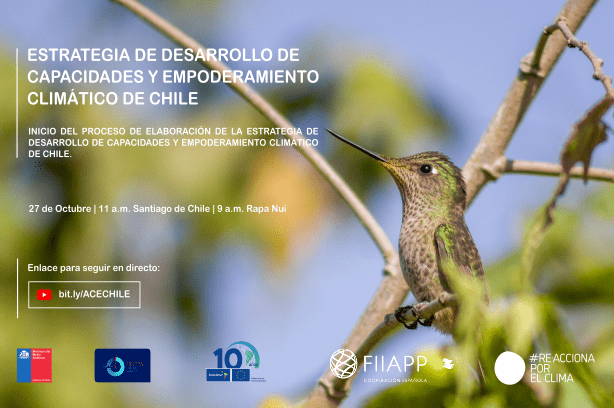The Chilean Ministry of the Environment is developing this strategy under the framework of the Action for Climate Empowerment promoted by the United Nations Framework Convention on Climate
Change and the Paris Agreement, and it has support from EUROCLIMA+
Santiago de Chile, November 03- On October 27, the presentation of the Chilean Strategy for Capacity Building and Climate Empowerment took place, an activity organised in order to disseminate and start the early participatory process of developing this strategy with representatives of non-governmental sectors.
Chile has incorporated the ACE approach into the draft Framework Law on Climate Change, which in turn implies the implementation of the Long-Term Strategy including its components as a main part in the development of the process. The acquisition of capacities and the performance of skills in the formal and non-formal spheres are particularly relevant for its full effectiveness.
The presentation ceremony included a welcome from Chile’s Minister of the Environment, Carolina Schmidt, who pointed out in her speech the relevance and importance of the incorporation of the ACE agenda in the Chilean NDC. "For the first time in an NDC, we have incorporated a social pillar that permeates all of our climate commitments, establishing a just transition strategy for the decarbonisation process, and the contribution of each of our climate commitments to the objectives of sustainable development and people 2030, with a special emphasis on gender equity, water security and nature-based solutions, and the knowledge of our indigenous peoples".
For his part, Ewout Sandker, Head of Cooperation of the European Union Delegation in Chile, highlighted the opportunity that is opening up against the pandemic to promote economic and social recovery that follows environmental sustainability criteria, in line with the proposal that the EU is promoting through the ”European Green Pact”. "An opportunity for countries, governments and citizens to show that we are capable of tackling these challenges by building more inclusive and resilient societies".
From EUROCLIMA+, Yayo Herrero, expert consultant in Action for Climate Empowerment, presented the general framework of the ACE agenda, valuing its importance in achieving general citizen appropriation of the climate challenge. "We cannot continue to look the other way; citizens must also be aware, know the origin of the problems, where they come from, what the consequences are and therefore how they can be addressed. These are all central elements that have to do with the ACE strategy, with working on action for climate empowerment".
Maritza Jadrijevic, from the Climate Change Office of the Chilean Ministry of the Environment, presented the elements that will make up the Strategy for Capacity Building and Climate Empowerment, as well as the methodology for the development and implementation process, which will be evaluated and updated every 5 years.
From the Climate Change Office of the Ministry for Ecological Transition and the Demographic Challenge of Spain, Paco Heras, highlighted the need to make progress on training teachers in the subject of Climate Change, as well as the importance of having institutional support in order to ensure the inclusion of environmental content in the educational curriculum. The Spanish Government is already working on the incorporation of Climate Change into the formal education system's curricula. Climate change, he said, is not a strictly scientific issue, but one that has social and ethical implications, and therefore needs to be addressed with a certain amount of mainstreaming." At the heart of it, levels of ambition are related to a society's perceptions of the problem, and its capacities to respond. Therefore, I believe that ACE intervenes in both components: on the one hand, understanding the problem of climate change is not easy, because it is a rather counter-intuitive phenomenon; but then the objectives are in line with the capacities of a society to fulfil them, and ACE can contribute to achieving these objectives that we assign ourselves as a society".
During the panel discussion, Paulina Aldunce, of Chile's Scientific Committee on Climate Change, reflected on the knowledge to be taken into account to promote ACE in all areas, and on the possibilities of connecting science with citizens and local communities and the importance of the word empowerment. For his part, Rodrigo Herrera, representative of the Citizens' Roundtable on Climate Change in Chile, shared the lessons learned from working in participatory spaces, such as the Citizens' Roundtable. Finally, Vairoa Ika, from the Chilean Indigenous Caucus on Climate Change in Rapa Nui, contributed the point of view of the indigenous communities towards ACE.
About EUROCLIMA+
EUROCLIMA+ is a programme financed by the European Union to promote environmentally sustainable and climate-resilient development in 18 Latin American countries, particularly for the benefit of the most vulnerable populations. The Programme is implemented under the synergistic work of seven agencies: the Spanish Agency for International Development Cooperation (AECID), the French Development Agency (AFD), the Economic Commission for Latin America and the Caribbean (ECLAC), the German Society for International Cooperation (GIZ) GmbH, Expertise France (EF), the International and Ibero-American Foundation for Public Administration and Policy (FIIAPP), and UN Environment.
Contact
Daniel Fernández: This email address is being protected from spambots. You need JavaScript enabled to view it.

